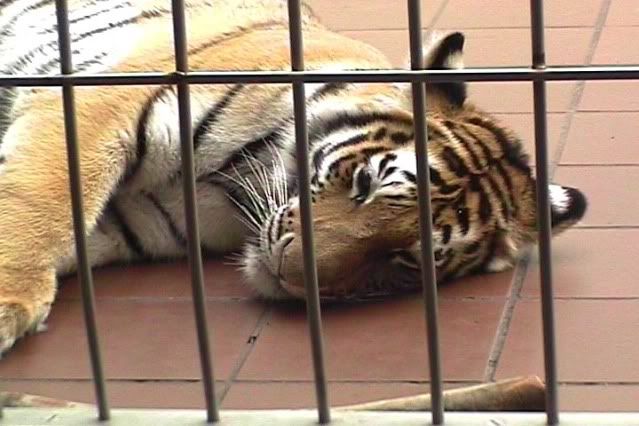Tigers are on the brink of extinction. This fact brought me initially surprise, and then immediately grief, despair, rage, anger and sadness. So, I’ve written about it– this is the fourth essay in a week — in an effort to alert others to this catastrophe. I consider the extinction of tigers and other big cats an environmental emergency, an impending disaster.
Category: Environment
Feb 14 2010
Happy Year Of The (Almost Extinct) Tiger
The Tiger is almost extinct. This situation is beyond disquieting. It’s a very scary, dire one for our small planet. As Meteor Blades wrote yesterday
“Sometimes fury and despair are the only responses that one can come up with. It seems as if nothing anybody does – laws, scoldings, appeals to people’s better nature – will stop this needless, heedless destruction.
Please join me in the jungle in Asia.
Jan 21 2010
15 Minutes
Watch CBS News Videos Online
copyright © 2010 Betsy L. Angert. BeThink.org
Today, Americans are engrossed in earthquake coverage. The tremor in Haiti bought unimaginable death and destruction just south of our borders. Events related to the recovery and rescues emerge as banner headlines. Haitians Seek Solace Amid the Ruins. For a week now, the struggle to survive, revive the injured, and retrieve the bodies strewn on the streets of Port-au-Prince was also the central theme of most every broadcast. In the midst of the misery, many Americans, felt desperate for a reprieve from the devastation that emotionally drained them. Millions took time to escape in a welcome distraction. Sassy, former Governor and Vice Presidential candidate, Sarah Palin Made Her Debut appearance on Fox. Tomorrow another reality will replace these stories, just as each superseded the hoopla over Harry Reid’s reference to race. Metaphorically, the tales provide persons, policies, and, or practices fifteen minutes of fame. In actuality, these fade from our mind quickly.
Jan 21 2010
The Week in Editorial Cartoons – Sarah Palin’s Brilliant FOX Debut
Crossposted from Daily Kos. I didn’t have the time yesterday to post it here.
THE WEEK IN EDITORIAL CARTOONS
This weekly diary takes a look at the past week’s important news stories from the perspective of our leading editorial cartoonists (including a few foreign ones) with analysis and commentary added in by me.
When evaluating a cartoon, ask yourself these questions:
1. Does a cartoon add to my existing knowledge base and help crystallize my thinking about the issue depicted?
2. Does the cartoonist have any obvious biases that distort reality?
3. Is the cartoonist reflecting prevailing public opinion or trying to shape it?The answers will help determine the effectiveness of the cartoonist’s message.
:: ::
The Teabaggers’ Intellectual
Jan 19 2010
EcoJustice: How is the dream?

Forty six years ago, Dr. Martin Luther King Jr. delivered I Have a Dream. In that speech, even one hundered years after emancipation, he spoke of black communities crippled by segregation and discrimination. They lived, ‘on a lonely island of poverty in the midst of a vast ocean of material prosperity.’
Today, blacks participate in all levels of professional society and leadership. We have a beautiful first family, former Secretaries of State, and even Supreme Court judges. It is common to see black lawmakers, doctors, lawyers, business professionals, and professors. Perhaps that ocean is embracing the island. One might think that discrimination is a thing of the past — that America is a place that tends toward racial equality…
Discrimination is a hellhound that gnaws at Negroes in every waking moment of their lives to remind them that the lie of their inferiority is accepted as truth in the society dominating them. –Dr. Martin Luther King, Jr.
If Dr. King could return and look at America, would he say the same thing today?
Dec 21 2009
Sunday Train: Doctor Dan prescribes High Speed Rail for Kentucky
Burning the Midnight Oil for Living Energy Independence
 Doctor Dan Mongiardo, Kentucky’s Lieutenant Governor, has announced that he is running for the Democratic nomination for the Kentucky Senate race, to take on whoever wins the Republican nomination to challenge for the seat that Senator Bunning (R-Big$$$) has announced he is giving up.
Doctor Dan Mongiardo, Kentucky’s Lieutenant Governor, has announced that he is running for the Democratic nomination for the Kentucky Senate race, to take on whoever wins the Republican nomination to challenge for the seat that Senator Bunning (R-Big$$$) has announced he is giving up.
Lots of politics to unwrap in that paragraph, which I’ll leave to the political wise-guys. The Sunday Train today is about Dr. Dan’s Rail Plan.
As far as I can tell, Dr. Dan’s Rail Plan has four main parts, and regular readers of the Sunday Train will recognize much from each of the four parts:
- Support for expanding Kentucky’s existing and potential Amtrak routes into 110mph Emerging Higher Speed Rail corridors
- Support for regional rail services to complete the above state rail map
- “Hybrid Light Rail” to provide cross-metropolitan local rail services, principally to Louisville
- Heavy investment in complementary local transit, including bus rapid transit and a high frequency driverless monotrain system for Kentucky.
Act Blue Page
For those looking to send some snake oil Doctor Dan’s way: Daniel Mongiardo’s Act Blue Page.
Dec 20 2009
Real News Network – Climate Debate
Part One (posted December 17):
Part Two (posted December 18):
Part Three (posted December 20):
Daniel J. Weiss is making a very disingenuous argument in his “we should only go for what’s possible” approach. He keeps falling back on the “perfect is the enemy of the good” line, as though anyone seriously expects or asks for perfection. He also ignores that when Medicare, Social Security, the Civil Rights Act, and the Clean Air Act were passed, the political environment was very different – Republicans could be rolled far more easily than they can be today. What’s more, by starting with the accommodation first and working down from there, substantive policies are not being passed. Weiss doesn’t even acknowledge the obvious tactical reality at work: obviously demanding everything from the start is not going to get us everything, but it can lead us to some actual compromise that everyone can live with. Daphne Wysham, who is advocating for stronger policies and takes the opposite argument, could have done a bit more to press the counterarguments I just mentioned, but overall it was a spirited and informative discussion. It’s certainly nothing like what you’d see on any of the cable news programs.
Dec 14 2009
Reform: Past, Present, Future, or Somewhere in Between
Once upon a time, we saw progress, particularly technological and medical progress, as both miraculous and uniformly desired. The romanticized meta-narrative of the the Twentieth Century was that it was the age of startling innovation and that indeed humanity might find its salvation in the latest invention to improve the human condition. The most common utterance at the time to describe this phenomenon was what will they think of next? The airplane and the automobile revolutionized travel and with it the spread of information and population dispersal. Penicillin was considered a wonder drug upon its introduction and indeed many lives were saved when it began being used on a wholesale fashion to combat infectious disease. The first pesticides were considered miraculous because they greatly increased the yield of crops, with the hopes that their introduction would increase the food supply and in time make widespread hunger a thing of the past. It was believed that our own ingenuity would be our salvation and in time, there was no telling what long-standing problem would have a easy, understandable solution.
Later, however, we began to cast suspicion on any advance lauded in messianic or wildly optimistic terms. To our horror we discovered that the drug which took away morning sickness also created tragic, hideous birth defects in babies born to women who took it. Then we read that the pesticides that, though they meant to increase the food supply, actually created major problems in the ecosystem around them—problems that skewed the natural environmental balance quite unintentionally but quite undeniably. In attempting to eradicate one pest, we often caused a huge increase in population of another organism, creating a brand new problem in the process. The system of pest control as set up by Mother Nature then was seen as more desirable as the one shaped by human hands. And this idea began to take shape in the minds of many to the degree that this belief has many adherents in this age. Take a stroll down the aisles of your local Whole Foods if you need a visual demonstration.
But I will say this. Old ways of doing things are not necessarily better ways of doing things. Though we may have swung the pendulum from one side to another in the course of half a century or so, we shouldn’t lose sight of the true balance of things. Anyone who has walked down a street where automobiles are not available and where all traffic directed down a major thoroughfare is pulled by horses knows the filth and the stench that fills the air and collects on either side of the roadway. It is for that reason, among others, that the horseless carriage was developed in the first place. We must not ever assume that the motives of those who came before us were summarily evil or distasteful simply because they did not have the ability to measure what they did by the power of hindsight. Any of us could look like geniuses if we had that in our favor. We often look for an easy enemy when the true hard work is to work to reach the point where we recognize that there are no easy answers and no easy targets. Demystifying the past does not imply that we ought to summarily scrap its lessons. The mythology of past ages needs to be removed, but those who view past behaviors and past events without rosy gloss can find many helpful examples for contemplation, provided, one doesn’t heave it into the trash can in one go, assuming the whole bunch is rotten all the way through.
The larger point I am making is that it is tempting these days to assume that the advances of the past are purely evil, based on their unforeseen and unintended consequences wrought by best intentions. We have gotten to the point now that we are reluctant at times to modify the world around us even in the slightest, lest we upset the fragile balance of energy, life, and movement that defines existence as any being currently alive. While we are humans, we are also animals, too. Our will dictates the shape and pace of the world around us, of course, but so also does our very existence. Global Warming is the buzzword phrase of the moment and while I do believe that human decision making has modified the climate and weather patterns for the worst, I do also know that the environment has a way of being adaptive that we often do not grant it, nor fully understand. We see things through such selfish, human terms at times, and even our best intentions do not disguise the fact that everything often relates back to us in the end. We were created selfish. Self-preservation is what consumes us above any other preoccupation. Still, this is an impulse we must fight against if we ever wish to live in peace with each other. We have more in common than we admit, but it’s often the very things we don’t like to admit even to ourselves. There is a limit to our understanding, and in fifty years from now, perhaps we’ll set aside Global Warming for the latest theory that defines our guilt and gives us a rallying point that demands we be unselfish not towards each other, but towards all living creatures.
Whether we are kings and queens of the beasts is a matter for debate, but we do have the benefit of higher brain function, and this is what makes us so much more influential than the average mammal. We seem to confuse at times the fact that we are both animals and also beings beholden to reason, somehow simultaneously separate from the fray. We exist in our own orbit and while it is wise to understand that the earth does not strictly belong to us, we do modify it by our very presence. When a butterfly can create a ripple effect just by flapping its wings, imagine what the average person creates by stepping outside on his or her way to work on the morning. I’m not saying that we ought not be aware of our carbon footprint and we ought not recognize that being less wasteful and more protective of nature is worthwhile, but that one can micromanage one’s degree of social consciousness to an extent that ending up miserable is the inevitable byproduct.
In a broader context to that, I notice how we lament the slow progress of reform and regulation. Our split loyalties are often to blame for this as well. If we were able to reach a happy medium between the supreme authority of old ways and the supreme authority of new ways, then we might actually get something done in a timely fashion. So much of Liberalism and Progressivism these days is conducted from a defensive posture, with the belief in the back of the mind that no matter what is set in play, it will inevitably blow up in the end and create more problems. Well, with all due respect, this is merely part of being alive. Any decision made will create future problems that no one could ever predict at the outset, but this shouldn’t paralyze our needed efforts, either.
Again, reform is a constant process of refining, re-honing, and revision. It’s foolish to expect that one bill, one policy statement, or one innovative strategy will come out perfect and never need to be updated to reflect changing times. Rather than seeing this established fact as frustrating or limiting, we need to modify our expectations. As President Obama said last week in his Nobel Peace Prize acceptance speech, “…[W]e do not have to think that human nature is perfect for us to still believe that the human condition can be perfected. We do not have to live in an idealized world to still reach for those ideals that will make it a better place.” We are imperfect. Our ideas, no matter how immaculately crafted at the time, are imperfect, and the passage of time will render them more imperfect.
But there is a difference between expecting individual or communal perfection on a case-by-case basis and not striving to improve the lives of those around us. A century from now, if there is a blogosphere, I’m sure many people will laugh at the nonsensical barbarism of a previous age where every citizen of the Earth did not have health care coverage from cradle to grave. But in this hypothetical example, it would be easy for them to make this judgment if they made it based on a naive, cavalier understanding of our times. If they viewed them purely through the lens of their times without understanding the events, beliefs, and myriad of factors which led us to undertake the great struggle before us, then their own perspectives could not be taken seriously. Again, we might be wise to understand why we always seem to crave an enemy. Voltaire mentioned that if God didn’t exist, it would be necessary for humanity to invent Him. Likewise, if enemies didn’t exist, it would be necessary for us to invent them. That the very same people who speak of unity and can’t understand why we don’t have it are among the first to construct an antagonistic force and project all of their frustrations upon it is the deepest irony of all. Our most powerful enemy is us.
Dec 14 2009
Sunday Train: Hey, Joe, I still want a Sustainable High Speed Electric Train for Christmas
Burning the Midnight Oil for Living Energy Independence
 Last year, I told VP Joe Biden about the Sustainable Electric High(er) Speed Rail I wanted for Christmas (cf. links below). It involved electrifying the 30,000+ miles of STRACNET, and establishing 100mph Rapid Freight Rail paths, including support for running 110mph or 125mph long haul electric passenger services on the Rapid Freight paths.
Last year, I told VP Joe Biden about the Sustainable Electric High(er) Speed Rail I wanted for Christmas (cf. links below). It involved electrifying the 30,000+ miles of STRACNET, and establishing 100mph Rapid Freight Rail paths, including support for running 110mph or 125mph long haul electric passenger services on the Rapid Freight paths.
In short, I wanted Joe Biden to take Alan Drake’s plan and just fracking DO it.
I didn’t get it for Christmas last year – but then, I guess he was only VP-elect last 25DEC08. The post today is to look at the progress toward the goal. The answer, surprisingly, is that we have made substantial progress. Certainly we are not halfway there, yet, but we are much further along than I expected to see.
Dec 12 2009
Your Head Will Explode
To corporate media hacks, there are no objective facts. Because they are incapable of either researching or comprehending what can be demonstrably proved, they dumb down all issues to mere partisan controversies. There is no scientific method. There are no historical contexts. There are two sides to every story, even when there really aren’t. Everything can be a legitimate source of bickering.
It’s not just juvenile, and it’s not just unprofessional; it is, in fact, dangerous. If a prominent Republican went flat-earther, Wolf Blitzer, David Broder and their ilk would reliably report on the new controversy over the shape of the earth. Andrea Mitchell just proved her credentials as an upstanding member of this upsidedown cult of unreality. On the eve of the Copenhagen Climate Change Conference, she interviewed Al Gore. Did she ask him about the science of climate change? Did she ask him about the politics? Did she ask him if the politics was dangerous, given the science? Of course not. As reported by Steve Benen:
This morning, Gore appeared on MSNBC, where Andrea Mitchell read from Sarah Palin’s Facebook page to ask the former vice president questions about climate change.
Let’s think about that, for a moment. Al Gore may be an imperfect messenger, but his understanding of climate change is steeped in science. He’s written books about it. Books that he not only read, but actually wrote. He won a Nobel Peace Prize for his work explaining climate change and trying to get the world to deal with it. In contrast, Sarah Palin has no understanding of climate change, whatsoever. Not only does she not understand the science of climate change, she doesn’t appear to understand science. Nothing in her resume credibly qualifies her to discuss climate change. To be kind, one could say that her best and most consistent professional qualification is that of a quitter. She’s not very good at it, but she does have plenty of experience.
But even more surreal is the context of Mitchell’s question. A supposedly serious supposed journalist asks a Nobel Prize winning expert what he thinks of the nitwit ramblings of an ignorant anti-intellectual that were posted to a Facebook page? Has the corporate media really dumbed itself that far down?
Apparently without laughing in her face or being stupefied into horrified silence, Gore gave Mitchell a succinct response:
“Well, you know, the global warming deniers persist in this air of unreality,” Gore explained. “After all, the entire north polar icecap, which has been there for most of the last 3 million years, is disappearing before our eyes. Forty percent is already gone. The rest is expected to go completely within the next decade. What do they think is causing this?”
Dec 07 2009
Break-In, Thieves Target Another Top Climate Scientist
In the wake of the illegal hacking of a leading climate scientist’s computers, to concoct a false scandal compared to which the birther absurdity is merely amusing, someone is criminally targeting another leading climate scientist.
Attempts have been made to break into the offices of one of Canada’s leading climate scientists, it was revealed yesterday. The victim was Andrew Weaver, a University of Victoria scientist and a key contributor to the work of the Inter-governmental Panel on Climate Change (IPCC). In one incident, an old computer was stolen and papers were disturbed.
In addition, individuals have attempted to impersonate technicians in a bid to access data from his office, said Weaver. The attempted breaches, on top of the hacking of files from British climate researcher Phil Jones, have heightened fears that climate-change deniers are mounting a campaign to discredit the work of leading meteorologists before the start of the Copenhagen climate summit tomorrow.
“The key thing is to try to find anybody who’s involved in any aspect of the IPCC and find something that you can … take out of context,” said Weaver. The prospect of more break-ins and hacking has forced researchers to step up computer security.
Someone is getting desperate. And it appears to be becoming a pattern. For more on Weaver, this is his homepage.
For those who don’t know about the literally criminal first false scandal, DarkSyde at Daily Kos made two superb posts:
Dec 06 2009
Solar Cell 40% Efficiency Breakthough, becomes Product Ready
This 40% breakthrough … has finally become available for your home (maybe?) and office use …
Solar cell breaks efficiency record
Michael Kanellos, CNET News — December 6, 2006
Boeing-Spectrolab has developed a solar cell that can convert almost 41 percent of the sunlight that strikes it into electricity, the latest step in trying to drop the cost of solar power.
Potentially, the solar cell could bring the cost of solar power down to around $3 a watt, after installation costs and other expenses are factored in, over the life of the panel.
[…]
Current silicon solar cells provide electricity at about $8 a watt, before government rebates. The goal is to bring it to $1 a watt without rebates or incentives.
http://news.cnet.com/Solar-cel…
Here is the Final Product from Spectrolab for your Home use. from this week’s news.



